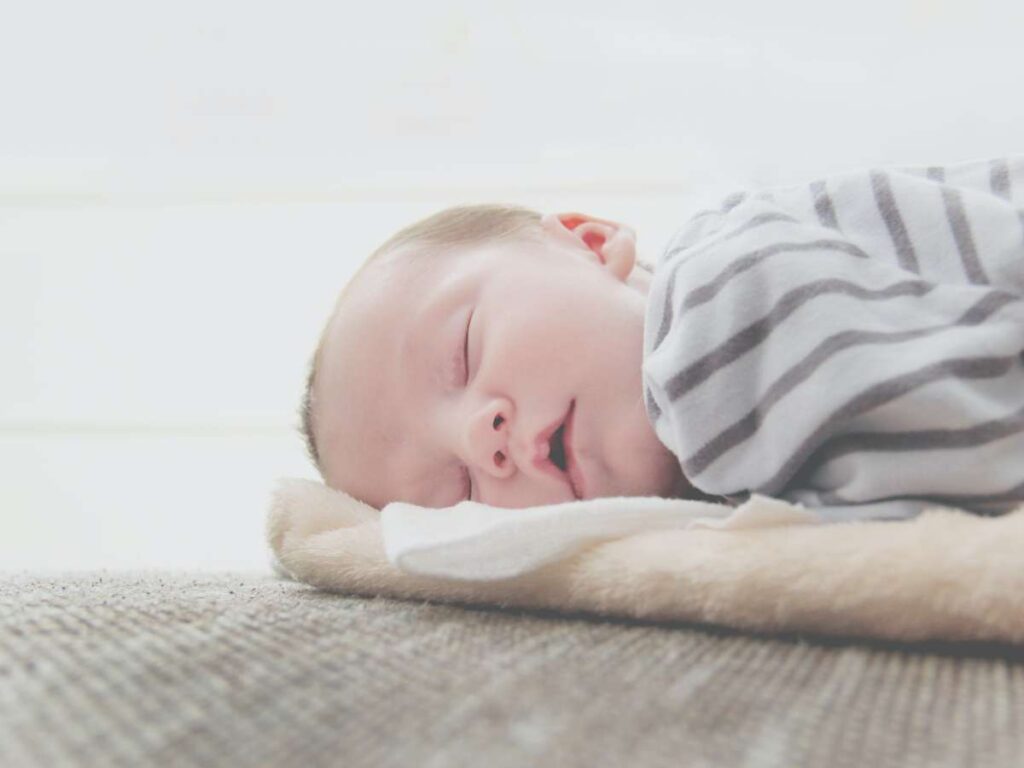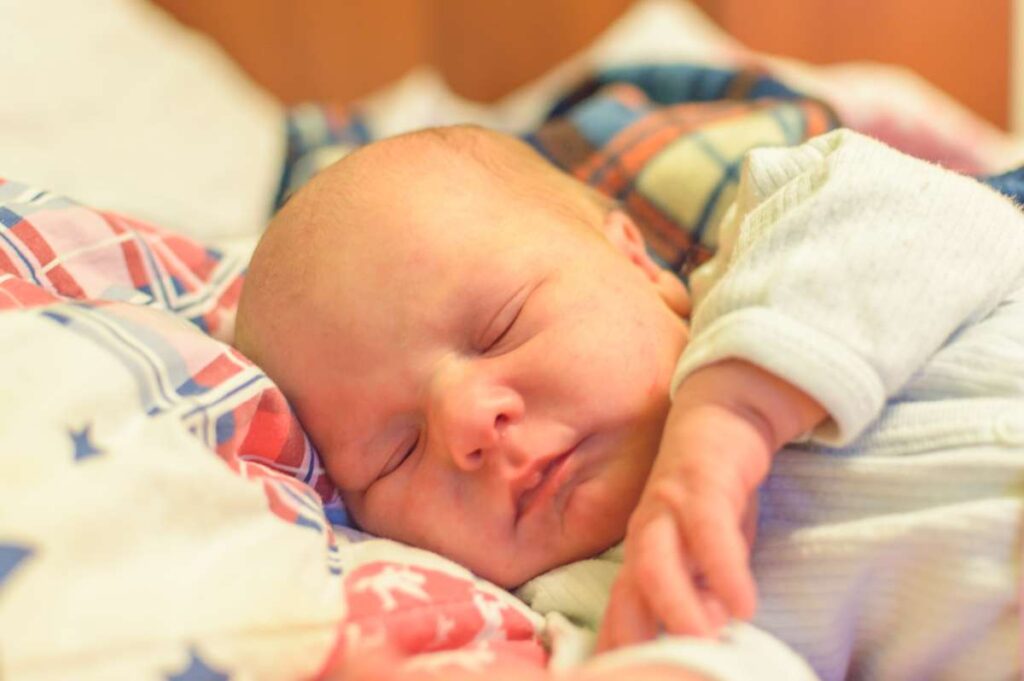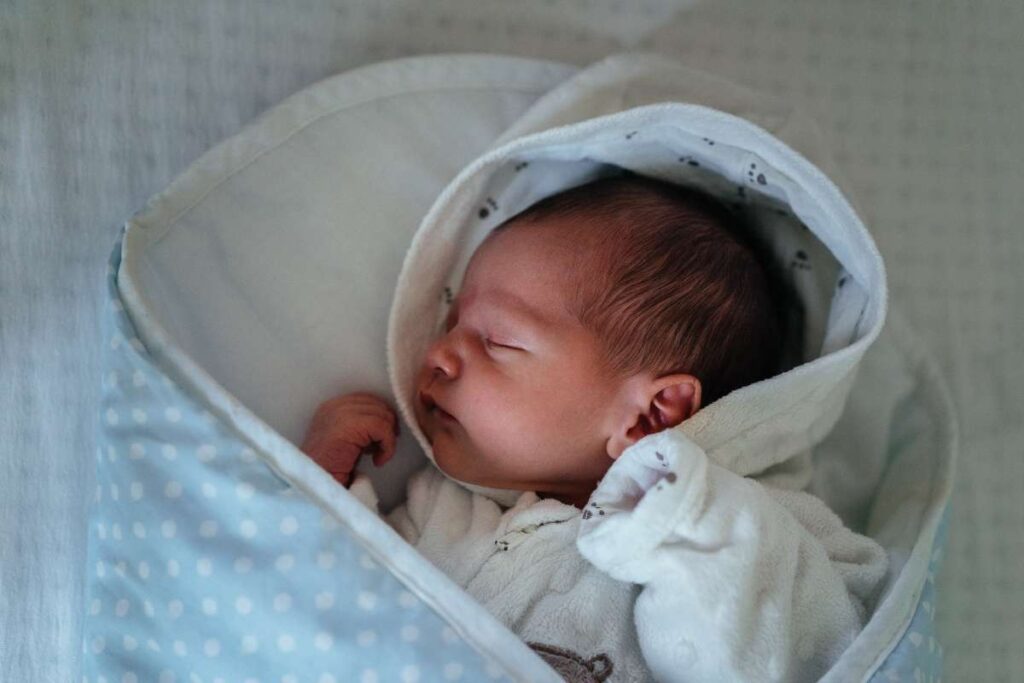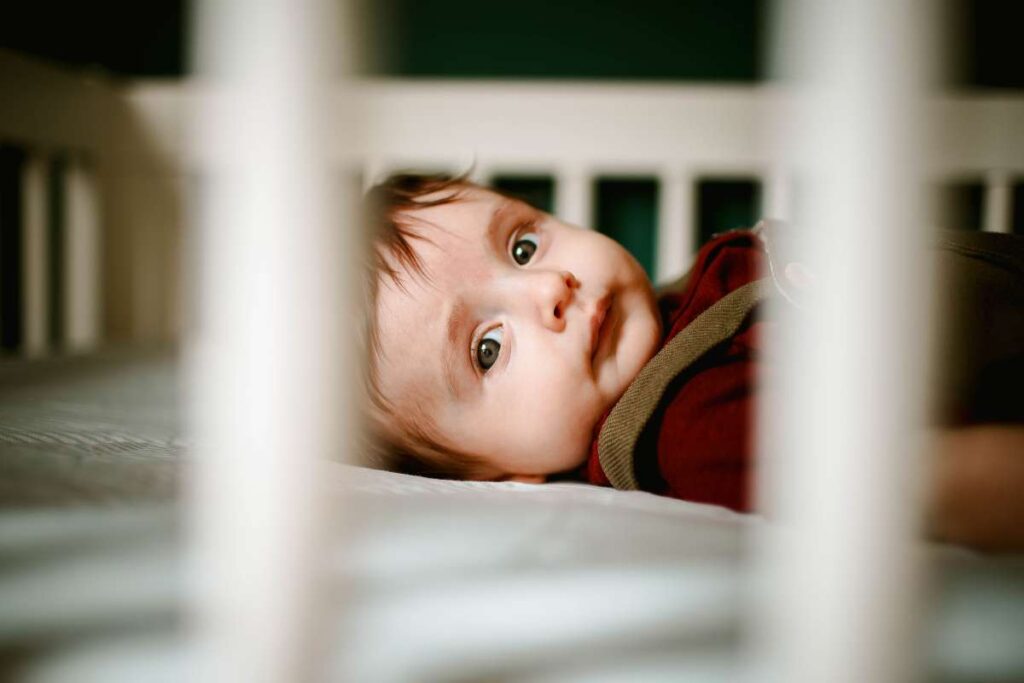For their own protection, infants should never be laid down on their stomachs to sleep. Since this can increase the risk of SIDS in infants. Your kid should not be put to sleep on his or her stomach either. If your youngster is currently sleeping on his side, he may accidentally roll over onto his stomach.
When you notice your baby rolling onto her side or stomach, it's time to put her back on her back. Some infants, particularly those who are a bit older, can, however, roll over from their stomachs or sides back onto their backs.
An older infant who can roll from her back to her stomach and from her stomach to her back may not need to be repositioned. Never leave your infant alone in their cot with any other objects.
Researchers have shown that babies who sleep face down on their stomachs have a higher risk of developing breathing problems. You should also know that babies who sleep on their bellies are more likely to "rebreathe" the air they have just exhaled.
The likelihood of this happening increases if your infant's crib has a plush mattress, bedding, stuffed animals, or a pillow within close proximity to his face. When someone breathes in recycled air, they take in less oxygen and produce more carbon dioxide.
Your baby should sleep on her back in her cot at all times until her first birthday. Put a firm mattress on the crib's floor and cover it with a fitted sheet.
Bumper pads, blankets, quilts, pillows, and stuffed animals are not permitted in the crib. It ought to be vacant.
Don't wake up a sleeping baby, by any means. Although babies can learn to roll over onto their tummies as early as 3 months of age, it is usually too late to teach them to return to their backs (especially if they prefer snoozing belly-down).
Experts agree that babies who are able to switch positions quickly are more likely to avoid whatever it is about belly sleeping that raises the risk of sudden infant death syndrome.
You should keep putting your baby down for naps and sleep on her back until she turns one. Keep all soft items, including cushions, blankets, bumpers, loose-fitting sheets, and stuffed toys, out of her crib, and always put her down on a firm surface to sleep.
FAQs About Baby Nursery
Your baby should not sleep on their stomach until one year old. They should always be placed on their back to sleep during the first 12 months to ensure a safe sleeping position.
If a baby without sufficient head control rolls onto their stomach, they could obstruct their airways, which can be a suffocation risk, according to Dr Murray. The reason pediatricians don't recommend stomach sleeping or propping a baby up on their side is that it could set the stage for accidental rolling.
Many infants sleep better on their stomachs, but they are also much less likely to develop plagiocephaly, a deformation of the skull that leaves infants with flattened heads.
Studies suggest that stomach sleeping may increase SIDS risk through various mechanisms, including Increasing the probability that the baby rebreathes their own exhaled breath, leading to carbon dioxide buildup and low oxygen levels. Causing upper airway obstruction.
Like a baby that gets stuck on its stomach, this phase usually only lasts for a few weeks. The simplest solution may be to flip your baby back onto their back and use a pacifier or some shushing noises to help them fall back to sleep.
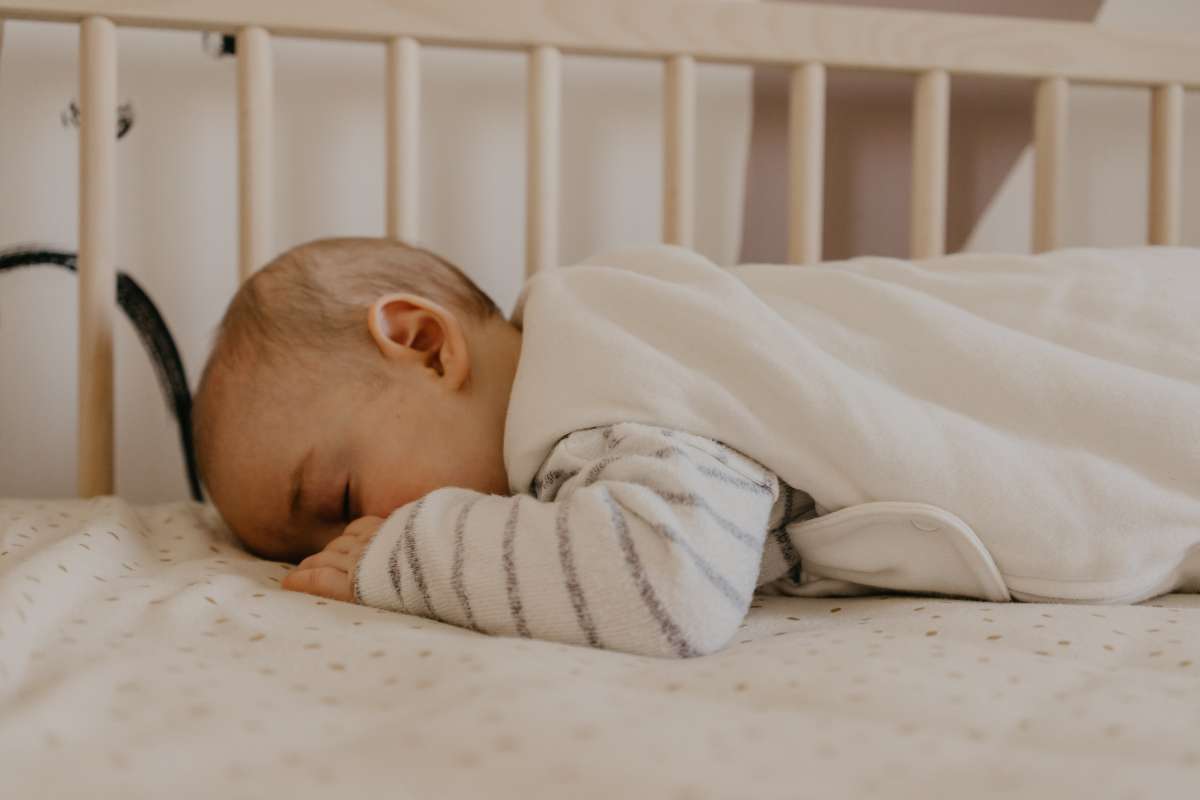
What to Do If Your Infant Rolls Over While Sleeping from Back to Stomach
Baby is now safely sleeping on her back thanks to your efforts. Of course, every new mother will tell you that if she wakes up in the middle of the night to find her baby resting on her stomach, she will have to get up and make some modifications regardless of how tired she is.
The good news is that you might not have to do that, depending on how old the infant is. It is not necessary to turn the baby onto his back if he is around six months old and has adequate head and trunk control (which he presumably does if he rolls over a lot). (But feel free to readjust him if you're awake.)
Some infants can flip onto their stomachs while sleeping as early as 3 or 4 months, however the average age is closer to 6 months. Turn the infant over onto her back carefully. These precautions can assist ensure the baby's safety all night long:
- Make sure he gets plenty of practise rolling over onto his back while he's awake and you can watch him.
- Unless you're swaddling, there shouldn't be any loose items in the crib. The risk of sudden infant death syndrome (SIDS) can be increased by using a loose blanket.
- Make sure the crib mattress is firm and up to code for safety.
- If your paediatrician suggests using a wedge or pillow, she may suggest placing it under the mattress.
It's crucial to remember to cease swaddling your baby once he or she begins to roll or turn over.
There Are Many Advantages to Having Your Infant Lie on Their Stomach to Sleep
It's no surprise that many infants favour face-down slumber. Somehow, I think they're onto something.
Simply put, it's more relaxing.
Babies that have started sleeping on their bellies do so since it's the most comfortable posture for them. Babies frequently turn over onto their stomachs while they sleep. Many people find it more relaxing than resting on their backs.
Do not use an infant positioner or nest if your baby is still fussy while on their back. These are dangerous and have been linked to the deaths of infants.
It is helpful to get your infant used to sleeping on their back by limiting the amount of time you spend carrying or wearing them during nap times.
Sleeping for Potentially Greater Periods of Time
Babies who favour sleeping on their bellies for extended periods of time. Further, studies have indicated that preterm infants, in particular, sleep better for longer stretches of time when placed in the prone position.
Warnings About Putting Your Newborn to Sleep on Their Stomach Too Soon
Putting your infant to sleep on their stomach too soon is not only against the advice of paediatricians, but can have very serious implications.
SIDS
Infants are most at risk for Sudden Infant Death Syndrome (SIDS) in the first six months of life, and while stomach sleeping has not been definitively linked to this condition, it is a risk factor.
There is a considerable association between stomach sleeping and SIDS, and the AAP Task Force on SIDS is very emphatic in recommending against it.
The National Institutes of Health reports that the incidence of sudden infant death syndrome (SIDS) has decreased in countries that have promoted back sleeping for infants.
Becker Freidman says that up to 30 minutes of tummy time per day can help your baby build the strength in their neck, shoulders, arms, and back necessary for them to learn to roll over on their own from back to front and back to front.
The baby can turn to the side, move around, and breathe normally even if their nose and mouth are on the mattress.
Suffocation
Dr. Murray says that babies who don't have good head control may suffocate if they roll over onto their bellies because their bodies may press on their airways. The risk of unintended rollover is one reason why paediatricians advise against stomach sleeping or propping a newborn up on their side.
Therefore, if your infant is showing symptoms of rolling at around 12 weeks of age, you should either stop swaddling them or switch to a sleep sack that doesn't restrict their upper body.
The same goes for weighted sleepsuits, which also offer threats to rollers since they prevent the baby from wriggling to a free-breathing position if they wind up face- and nose-down on the mattress.
Rebreathing
Infants who sleep on their bellies may inadvertently try to rebreathe carbon dioxide and oxygen-depleted air from their bedding. Most infants will awaken and be just fine after taking a few deep breaths of fresh air. However, rebreathing is a possible SIDS trigger because it causes some newborns to be slower to respond or to be unable to roll over and hence lose consciousness.
Overheating
Newborns with low birth weight may have a harder time releasing heat and maintaining a healthy temperature if they sleep on their bellies, according to a new study. Overheating is a known contributor to sudden infant death syndrome.
Use a thin, wearable blanket and keep your baby's head and face exposed to prevent overheating. Take off a layer or turn down the heat if they're sweating or reacting with heat when you touch their chest.
The Blockage of the Upper Airway
A common misconception among parents is that their babies are safer if they sleep on their stomachs since they can't aspirate liquids if they vomit while asleep.
As it happens, though, the inverse is correct. Spitting up when sleeping poses less of a risk of aspiration for those who prefer to lay on their backs because of where their trachea and oesophagus are located.

Advice for Putting Infants to Bed Safely
The majority of parents are aware of the preventative measures that may be taken to protect their infants from SIDS, but sadly, many of them choose to ignore them. Learn the best practises for putting your baby to sleep at nap time and night time without worrying about their well-being.
Alongside Safe Kids Worldwide, an organisation whose mission is to reduce the number of preventable child injuries, we surveyed 4,547 mothers in 2014.
All of the mothers surveyed here had infants younger than one year old, and 96% are aware that infants should sleep in a crib by themselves, on their backs. Even when caring for their baby, they occasionally deviated from the plan.
There are around 3,500 annual cases of Sudden Infant Death Syndrome, so taking this step is hazardous (SUID). Some occurrences of SUID, such as sudden infant death syndrome (SIDS), might still happen even if parents followed all the safety precautions. Many occurrences defy explanation. However, "the number would be significantly smaller" if parents followed standard safety procedures.
It's not helpful to point fingers; mothers who choose to forego the recommended amount of sleep aren't awful people. At three in the morning, they conclude that their infant's cries are tolerable.
Infants need only a crib and a secure mattress to sleep safely.
The vast majority of mothers (73%) who participated in our poll admit to putting something inside the cot with their infant. The majority of children (59%) prefered a blanket to other bedding, which was followed by bumpers (35%), stuffed animals (23%), and pillows (23%). (8 per cent). No matter how Baby sleeps, all of them pose suffocation risks for infants aged 1 and under, and can increase the risk of sudden infant death syndrome by as much as a factor of five, according to the American Academy of Pediatrics (AAP).
There is often confusion in the messages sent to mothers. According to the director of academic development at Children's National Health System in Washington, D.C. and chair of the AAP's task force on SIDS, "when women walk through a baby store or flip through a catalogue or magazine, they see bumpers, blankets, and stuffed animals and they think they need to buy them to be good parents."
In preparing your baby's crib, keep in mind that less is more. It is recommended that just a fitted sheet be used in a baby's crib. No soft objects such as pillows, stuffed animals, sleep positioners, sleep wedges, or the ubiquitous crib bumper, which has been related to suffocation and strangulation in infants.
Remember that it is best to lay your baby down on her back to sleep.
A shocking 28% of mothers admit to putting their infant to sleep on his or her stomach, a position associated with an elevated risk of sudden infant death syndrome. Fourteen percent of parents take this chance before their infants reach the age of three months.
This is the time when SIDS is most likely to occur, between the first four months.
Some of these parents are acting in a way that we would label "conscientious objection." "They think that what they are doing is somehow better or safer than what their paediatrician is telling them."
Example: parents who are trying to avoid the sound of their baby's cries may find ways to justify their child's stomach sleeping position. Babies do seem to wake up more quickly when placed on their backs. Nonetheless, that might keep them safe from sudden infant death syndrome. Babies who sleep on their bellies don't wake up as often, which can lead to dangerously low oxygen levels if they don't get attention.
Ten percent of rule-breakers also cited concerns that Baby will choke on acid from GERD as their justification for breaking this norm. There's absolutely zero proof of that. One is more likely to choke while sleeping on their stomach than on their back.
Make lying on the back the default position for infants. Babies can only learn to sleep on their backs if you put them there from the start. The situation is the same as that of a baby who resists being strapped into his car seat. There's no way to drive with him not buckled in his car seat.
Co-sleeping is risky, so use caution.
Co-sleeping, or sleeping on the same bed as the infant, is quite popular. Among the mothers we surveyed, 65% reported having shared a bed with their newborn, with 38% saying they did so on a weekly basis.
Most mothers who put their babies to sleep on their bed are concerned about the possibility of suffocation, but they do it regardless. Why? When asked why they do it, parents typically respond that it aids in sleep, facilitates nursing, promotes parental bonding, and that Baby simply refuses to sleep anywhere else.
However, sleeping with someone else is quite risky. Research shows that newborn suffocation deaths are approximately twice as likely to occur in an adult bed than in any other setting. Infant mortality is more than 40 times greater when babies sleep on a bed with their parents instead of a crib.
There are many ways for Baby to suffocate in an adult bed, including the softer mattress, the larger pillows, the fluffier comforters, and the more blankets. Many terrible accidents involve parents who tragically assume they are light sleepers and would wake up if they rolled over on their baby.
Baby should sleep in a portable crib in your bedroom for maximum security. After she becomes accustomed to that, you can transfer her to a cot in her room. She won't just be secure, but she'll have a better night's rest. One study showed that compared to babies sleeping independently, those who slept alongside their parents woke up twice as often during the night. They can't fall asleep because they don't know how to calm themselves.
Never put your infant in a couch or chair to sleep.
Our experts were taken aback by the fact that 53% of the mothers surveyed said their infants spent time on the couch with them. The sofa is the worst option because it is often softer and plusher than an adult bed, and parents run the risk of suffocating their child if they unintentionally turn over on them.
Some parents mistakenly believe that couch-sleeping is safer than bed-sharing with their infants since Baby won't be able to roll off the couch if she is wedged between Mom and Dad. In actuality, the situation is far more dangerous if the youngster becomes wedged between the parent's body and the couch.
If you spend time with your baby in her cot before bed, you can increase her safety. In the evening or when you're too tired to get up, the couch is not the best place to feed or nurse your kid.
That's because it's more conducive to sleep than elsewhere. It's not a good idea to hug your sleeping significant other while you scroll through your Netflix list.
Finally, a sleeping infant should never be set down on a sofa. While 18 percent of mothers report that their infant has slept alone on a couch, this is never a good idea, even if you are awake. Suffocation can happen in as little as one minute.
Conclusion
For their own protection, infants should never be laid down on their stomachs to sleep. This can increase the risk of SIDS in infants. Babies who sleep on their bellies are more likely to "rebreathe" the air they have just exhaled. It's crucial to remember to cease swaddling your baby once he or she begins to roll or turn over. Some infants can flip onto their stomachs while sleeping as early as 3 or 4 months.
The average age is closer to 6 months for this stage of sleep. Putting your infant to sleep on their stomach too soon can have serious implications. Infants are most at risk for Sudden Infant Death Syndrome (SIDS) in the first six months of life. Babies who don't have good head control may suffocate if they roll over onto their bellies. Newborns with low birth weight may have a harder time releasing heat and maintaining a healthy temperature if they sleep on their bellies.
There are around 3,500 annual cases of Sudden Infant Death Syndrome (SUID) in the U.S. A shocking 28% of mothers admit to putting their infant to sleep on his or her stomach. Sudden infant death syndrome (SIDS) is most likely to occur between the first four months and three-quarters of the way through a child's life. It is recommended that just a fitted sheet be used in a baby's crib. Co-sleeping, or sleeping on the same bed as the infant, is quite popular.
Infant mortality is more than 40 times greater when babies sleep on a bed with their parents. Research shows that newborn suffocation deaths are twice as likely to occur in an adult bed. If you put your baby in a cot before bed, she'll be more secure and have a better night's rest. Couch-sharing with your infant is never a good idea, even if you are awake. 18 percent of mothers report that their infant has slept alone on a couch.
Content Summary
- For their own protection, infants should never be laid down on their stomachs to sleep.
- Your kid should not be put to sleep on his or her stomach either.
- When you notice your baby rolling onto her side or stomach, it's time to put her back on her back.
- Never leave your infant alone in their cot with any other objects.
- Researchers have shown that babies who sleep face down on their stomachs have a higher risk of developing breathing problems.
- Your baby should sleep on her back in her cot at all times until her first birthday.
- Don't wake up a sleeping baby, by any means.
- You should keep putting your baby down for naps and sleep on her back until she turns one.
- Baby is now safely sleeping on her back thanks to your efforts.
- Turn the infant over onto her back carefully.
- These precautions can assist ensure the baby's safety all night long: Make sure he gets plenty of practise rolling over onto his back while he's awake and you can watch him.
- Make sure the crib mattress is firm and up to code for safety.
- There Are Many Advantages to Having Your Infant Lie on Their Stomach to Sleep It's no surprise that many infants favour face-down slumber.
- Babies frequently turn over onto their stomachs while they sleep.
- Do not use an infant positioner or nest if your baby is still fussy while on their back.
- Further, studies have indicated that preterm infants, in particular, sleep better for longer stretches of time when placed in the prone position.
- Warnings About Putting Your Newborn to Sleep on Their Stomach Too Soon Putting your infant to sleep on their stomach too soon is not only against the advice of paediatricians, but can have very serious implications.
- SIDS Infants are most at risk for Sudden Infant Death Syndrome (SIDS) in the first six months of life, and while stomach sleeping has not been definitively linked to this condition, it is a risk factor.
- There is a considerable association between stomach sleeping and SIDS, and the AAP Task Force on SIDS is very emphatic in recommending against it.
- The risk of unintended rollover is one reason why paediatricians advise against stomach sleeping or propping a newborn up on their side.
- However, rebreathing is a possible SIDS trigger because it causes some newborns to be slower to respond or to be unable to roll over and hence lose consciousness.
- Newborns with low birth weight may have a harder time releasing heat and maintaining a healthy temperature if they sleep on their bellies, according to a new study.
- Overheating is a known contributor to sudden infant death syndrome.
- Use a thin, wearable blanket and keep your baby's head and face exposed to prevent overheating.
- The Blockage of the Upper Airway A common misconception among parents is that their babies are safer if they sleep on their stomachs since they can't aspirate liquids if they vomit while asleep.
- Spitting up when sleeping poses less of a risk of aspiration for those who prefer to lay on their backs because of where their trachea and oesophagus are located.
- Advice for Putting Infants to Bed Safely The majority of parents are aware of the preventative measures that may be taken to protect their infants from SIDS, but sadly, many of them choose to ignore them.
- Learn the best practises for putting your baby to sleep at nap time and night time without worrying about their well-being.
- Alongside Safe Kids Worldwide, an organisation whose mission is to reduce the number of preventable child injuries, we surveyed 4,547 mothers in 2014.
- All of the mothers surveyed here had infants younger than one year old, and 96% are aware that infants should sleep in a crib by themselves, on their backs.
- There are around 3,500 annual cases of Sudden Infant Death Syndrome, so taking this step is hazardous (SUID).
- Some occurrences of SUID, such as sudden infant death syndrome (SIDS), might still happen even if parents followed all the safety precautions.
- No matter how Baby sleeps, all of them pose suffocation risks for infants aged 1 and under, and can increase the risk of sudden infant death syndrome by as much as a factor of five, according to the American Academy of Pediatrics (AAP).
- In preparing your baby's crib, keep in mind that less is more.
- Remember that it is best to lay your baby down on her back to sleep.
- A shocking 28% of mothers admit to putting their infant to sleep on his or her stomach, a position associated with an elevated risk of sudden infant death syndrome.
- Fourteen percent of parents take this chance before their infants reach the age of three months.
- Ten percent of rule-breakers also cited concerns that Baby will choke on acid from GERD as their justification for breaking this norm.
- Babies can only learn to sleep on their backs if you put them there from the start.
- The situation is the same as that of a baby who resists being strapped into his car seat.
- There's no way to drive with him not buckled in his car seat.
- Co-sleeping is risky, so use caution.
- Co-sleeping, or sleeping on the same bed as the infant, is quite popular.
- Most mothers who put their babies to sleep on their bed are concerned about the possibility of suffocation, but they do it regardless.
- Why?
- However, sleeping with someone else is quite risky.
- Research shows that newborn suffocation deaths are approximately twice as likely to occur in an adult bed than in any other setting.
- Infant mortality is more than 40 times greater when babies sleep on a bed with their parents instead of a crib.
- There are many ways for Baby to suffocate in an adult bed, including the softer mattress, the larger pillows, the fluffier comforters, and the more blankets.
- Baby should sleep in a portable crib in your bedroom for maximum security.
- One study showed that compared to babies sleeping independently, those who slept alongside their parents woke up twice as often during the night.
- Never put your infant in a couch or chair to sleep.
- Our experts were taken aback by the fact that 53% of the mothers surveyed said their infants spent time on the couch with them.
- If you spend time with your baby in her cot before bed, you can increase her safety.
- In the evening or when you're too tired to get up, the couch is not the best place to feed or nurse your kid.
- That's because it's more conducive to sleep than elsewhere.
- Finally, a sleeping infant should never be set down on a sofa.
- While 18 percent of mothers report that their infant has slept alone on a couch, this is never a good idea, even if you are awake.
